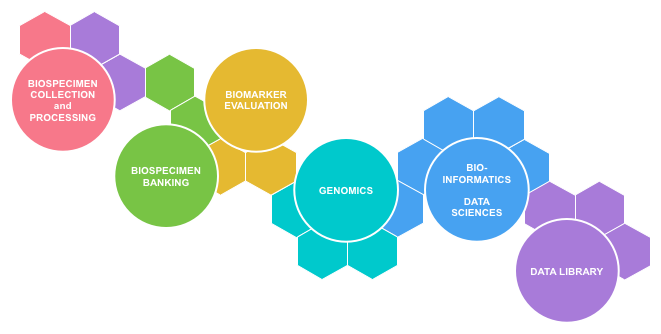
Our lab performs a continuum of wet and dry laboratory methods in support of molecular, genomic, and data science analytics used for health science and basic science research.
Molecular (Wet) Lab
Our lab performs a variety of molecular techniques to support our research projects, including:
- Training students, Post-docs, faculty on molecular techniques and study design
- Specimen processing (Biohazard risk group 2)
- Specimen banking (>6000 patients, >20,000 specimens)
- Specimen types (blood, hair, saliva, urine)
- Patient populations (oncology, diabetes, cardiovascular disease, HIV, substance use, preterm birth, mental health disorders)
- Isolation of nucleic acid (total RNA, small RNA, DNA), serum, plasma from blood
- Host (Human) and virus (HIV) nucleic acid processing
- Gel electrophoresis
- PCR
- qPCR
- ELISA
- Sanger sequencing (using core facility)
- NextGen library preparation and sequencing (DNAseq, RNAseq using core facility)
- Custom and whole-genome microarray (i.e., genotype, transcriptome, and methylome using core facility)
- Core facilities used: UCSF Genomics core (now defunct), UC Berkeley DNA Sequencing Facility, UC Berkeley/QB3 Functional Genomics Laboratory and Vincent J. Coates Genomics Sequencing Laboratory, UC Davis Genome Center DNA Technologies and Expression Analysis Core Facilities.
Computational (Dry) Lab
We have a modest but powerful computational infrastructure consisting of compute nodes, storage nodes, and administrative (e.g., monitoring and backup) servers.
Our lab applies and develops a variety of computational approaches, including:
- Training students, Post-docs, faculty on bioinformatics techniques and study design
- High throughput ‘Omics data collection, storage, backup, wrangling, and retrieval
- Microarray data processing
- DNAseq/RNAseq alignments
- Variant calling (e.g., GATK, MARSS)
- Population genetics (GWAS, candidate gene associations, shinyGAStool )
- Population epigenetics (methylation)
- Whole-transcriptome differential gene expression and pathway analysis
- Data-integrated ‘omics analyses (e.g., transcriptome and methylation)
- Data analyses pipelines
- Comparative Genomics
- Phylogenomics
- Machine Learning